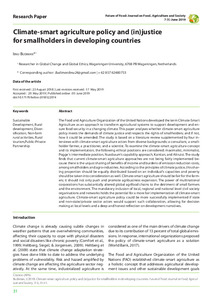Datum
2019-06-05Autor
Budiman, IbnuSchlagwort
630 Landwirtschaft, VeterinärmedizinMetadata
Zur Langanzeige
Aufsatz

Climate-smart agriculture policy and (in)justice for smallholders in developing countries
Zusammenfassung
The Food and Agriculture Organization of the United Nations developed the term Climate-Smart Agriculture as an approach to transform agricultural systems to support development and ensure food security in a changing climate. This paper analyses whether climate-smart agriculture policy meets the demands of climate justice and respects the rights of smallholders; and if not, how it could be amended. The study is based on a literature review supplemented by four interviews with climate-smart agriculture actors from diverse backgrounds: a consultant, a small-holder farmer, a practitioner, and a scientist. To examine the climate-smart agriculture concept and its implementation, the following ethical positions are considered: maximalist, minimalist, Pogge ́s intermediate position, Nussbaum's capability approach, Kantian, and Altruist. The study finds that current climate-smart agriculture approaches are not being fairly implemented because there is the unjust sharing of benefits of income and burdens of emission reduction costs, among smallholders and agro-industries. According to the principles of climate justice, this sharing proportion should be equally distributed based on an individual's capacities and poverty should be taken into consideration as well. Climate-smart agriculture should be fair for the farmers; it should not only push and promote agribusiness expansion. The power of multinational corporations has substantially altered global agrifood chains to the detriment of small farmers and the environment. The mandatory inclusion of local, regional and national level civil society organisations and networks holds the potential for a more fair implementation of climate-smart agriculture. Climate-smart agriculture policy could be more successfully implemented if state and non-state/private sector actors would support such collaboration, allowing for decision making at local levels and a deep and honest reflection on development narratives.
Zitierform
In: Future of Food: Journal on Food, Agriculture and Society Vol. 7 / No. 1 (2019-06-05) , S. 31-41 ; ISSN 2197-411XSammlung(en)
Vol 07, No 1 (2019) (Future of Food: Journal on Food, Agriculture & Society // The Future of Food Journal: Journal on Food, Agriculture & Society)Zitieren
@article{doi:10.17170/kobra-2018122074,
author={Budiman, Ibnu},
title={Climate-smart agriculture policy and (in)justice for smallholders in developing countries},
journal={Future of Food: Journal on Food, Agriculture and Society},
year={2019}
}
0500 Oax 0501 Text $btxt$2rdacontent 0502 Computermedien $bc$2rdacarrier 1100 2019$n2019 1500 1/eng 2050 ##0##http://hdl.handle.net/123456789/11265 3000 Budiman, Ibnu 4000 Climate-smart agriculture policy and (in)justice for smallholders in developing countries / Budiman, Ibnu 4030 4060 Online-Ressource 4085 ##0##=u http://nbn-resolving.de/http://hdl.handle.net/123456789/11265=x R 4204 \$dAufsatz 4170 7136 ##0##http://hdl.handle.net/123456789/11265
<resource xsi:schemaLocation="http://datacite.org/schema/kernel-2.2 http://schema.datacite.org/meta/kernel-2.2/metadata.xsd"> 2019-06-14T13:08:27Z 2019-06-14T13:08:27Z 2019-06-05 doi:10.17170/kobra-2018122074 http://hdl.handle.net/123456789/11265 eng Section Specialized Partnerships in Sustainable Food Systems and Food Sovereignty at the University of Kassel, Germany and Federation of German Scientists (VDW) Urheberrechtlich geschützt https://rightsstatements.org/page/InC/1.0/ Sustainable Development Rural development Diversification Non-farm rural activities Rural tourism Public-Private Partnership 630 Climate-smart agriculture policy and (in)justice for smallholders in developing countries Aufsatz The Food and Agriculture Organization of the United Nations developed the term Climate-Smart Agriculture as an approach to transform agricultural systems to support development and ensure food security in a changing climate. This paper analyses whether climate-smart agriculture policy meets the demands of climate justice and respects the rights of smallholders; and if not, how it could be amended. The study is based on a literature review supplemented by four interviews with climate-smart agriculture actors from diverse backgrounds: a consultant, a small-holder farmer, a practitioner, and a scientist. To examine the climate-smart agriculture concept and its implementation, the following ethical positions are considered: maximalist, minimalist, Pogge ́s intermediate position, Nussbaum's capability approach, Kantian, and Altruist. The study finds that current climate-smart agriculture approaches are not being fairly implemented because there is the unjust sharing of benefits of income and burdens of emission reduction costs, among smallholders and agro-industries. According to the principles of climate justice, this sharing proportion should be equally distributed based on an individual's capacities and poverty should be taken into consideration as well. Climate-smart agriculture should be fair for the farmers; it should not only push and promote agribusiness expansion. The power of multinational corporations has substantially altered global agrifood chains to the detriment of small farmers and the environment. The mandatory inclusion of local, regional and national level civil society organisations and networks holds the potential for a more fair implementation of climate-smart agriculture. Climate-smart agriculture policy could be more successfully implemented if state and non-state/private sector actors would support such collaboration, allowing for decision making at local levels and a deep and honest reflection on development narratives. open access Budiman, Ibnu publishedVersion ISSN 2197-411X No. 1 Future of Food: Journal on Food, Agriculture and Society 31-41 Vol. 7 </resource>
Die folgenden Lizenzbestimmungen sind mit dieser Ressource verbunden:
Urheberrechtlich geschützt

